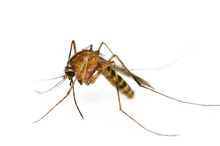In the first reported case of 2012, the New Jersey Department of Agriculture has issued a press release regarding a 3-year-old horse from Burlington County which was euthanized on May 27 after testing positive for Eastern Equine Encephalitis (EEE), a serious, mosquito-borne illness in horses.

Mosquito-borne virus
EEE causes inflammation of the brain tissue and poses a significantly higher risk of death in horses than West Nile Virus infection.
"It is very early in the season to see Eastern Equine Encephalitis so horse owners need to be vigilant in vaccinating their animals against diseases spread by mosquitoes," said New Jersey Secretary of Agriculture Douglas H. Fisher. "We hope this incident will raise awareness about the need to protect our official state animal from this and other harmful diseases, especially since June is the Month of the Horse in our state."
EEE is preventable by vaccination, and effective equine vaccines for EEE and West Nile Virus, another mosquito-borne disease, are available commercially, the Department of Agriculture said. Horse owners should contact their veterinarians if their horses are not already up to date on their vaccinations against both EEE and West Nile Virus.
The Burlington County mare had been given the first in a series of two planned EEE vaccinations by a private veterinarian at the beginning of May.
EEE causes inflammation of the brain tissue and poses a significantly higher risk of death in horses than West Nile Virus infection. West Nile Virus is a viral disease that affects horses' neurological systems; the disease is transmitted by mosquito bite.
The virus cycles between birds and mosquitoes, with horses and humans being "incidental hosts," according to the Department of Agriculture. EEE infections in horses are not a significant risk factor for human infection because horses, like humans, are considered to be "dead-end" hosts for the virus.
In 2011, New Jersey had one case of EEE and one case of equine West Nile Virus. One animal was euthanized, and the other recovered. Both cases came in October after Hurricane Irene and subsequent rains caused flooding that resulted in much higher-than-normal mosquito populations.
Learn more about EEE
